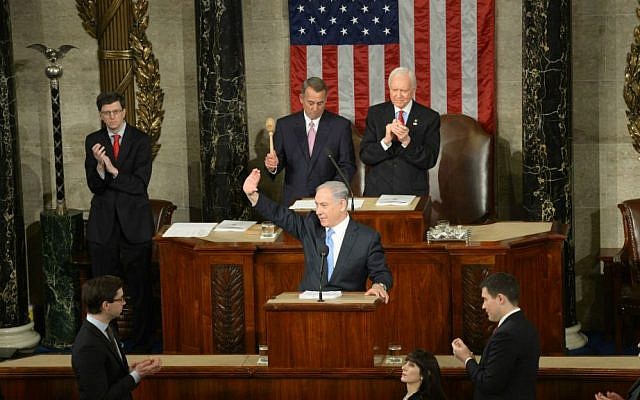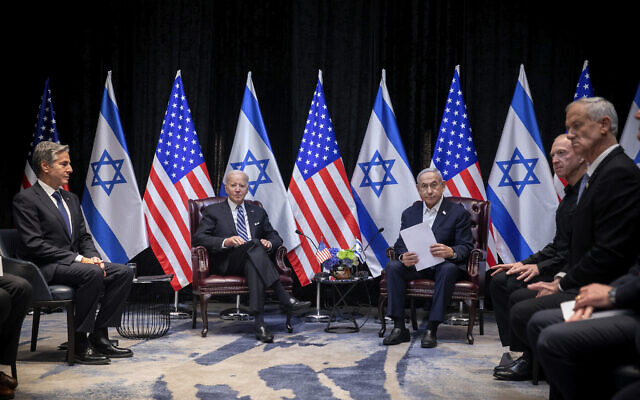



US Senate Majority Leader Chuck Schumer appeared on Thursday to take up House Speaker Mike Johnson’s proposal to invite Prime Minister Benjamin Netanyahu to speak at a joint session of Congress on the Israel-Hamas war.
Johnson said Wednesday that he was considering the idea, and went further in a CNBC interview Thursday morning, saying, “We’ll certainly extend that invitation” and “We’re just trying to work out schedules on all this.”
A spokesperson for Schumer said in response that the Republican House speaker had yet to discuss the matter with him. However, the Democratic Senate majority leader said in a statement, “I will always welcome the opportunity for the prime minister of Israel to speak to Congress in a bipartisan way.”
On Wednesday, Schumer’s office confirmed that he had declined a request from Netanyahu to address the Democratic caucus in the Senate, explaining that such a meeting shouldn’t be held in a partisan format. The GOP’s Senate leadership, on the other hand, accepted the proposal and Netanyahu ended up speaking to them in a private session.
An address to a joint session of Congress would require approval from the Senate majority leader, in addition to an invitation from the House speaker. Johnson told CNBC that he would be fine with the possibility of Netanyahu just addressing the House if Schumer were to decline to cooperate.
“But I think a big majority, that Senate would want to come and stand in support of Netanyahu and Israel,” Johnson said.
Dozens of Democrats boycotted Netanyahu’s last joint session address in 2015, after it was organized behind the back of then-US president Barack Obama so that the Israeli premier could lobby Congress against the Iran nuclear deal negotiated by the White House.
Netanyahu’s popularity among Democrats has only sunk since, with Schumer — a longtime pro-Israel stalwart — giving a speech last week on the Senate floor calling for early elections to replace the longtime prime minister. The highest-ranking Jewish lawmaker in US history argued that Netanyahu has “lost his way” in prioritizing his political survival over the good of the country and represented an obstacle to peace along with Hamas, the Israeli far-right and Palestinian Authority President Mahmoud Abbas.
The speech infuriated Israeli officials and set off a flood of criticism from Republicans as well, seemingly leading Johnson to raise the idea of a joint session address, as Israel — and its current government in particular — increasingly becomes a political football in Washington.
Johnson again blasted Schumer’s “outrageous” speech in his Thursday CNBC interview. “To suggest to our strongest ally in the Middle East, the only stable democracy [there], that he knows better how to run their democracy is just patently absurd. Imagine if I came on your show this morning and called for regime change in Ukraine in the middle of their crisis fighting for their very survival. That’s what Israel is facing right now.”
Unlike with the Iran nuclear deal, when Congress was needed to ratify the agreement, the Hill’s role in setting policy for the war in Gaza is much less influential.
A Netanyahu speech would also risk upsetting US President Joe Biden whose support is critical for Israel, as it relies on regular US ammunition shipments for its fighting against Hamas in Gaza and more critically to prepare for a potential war with the much more formidable foe of Hezbollah in Lebanon.
Biden was vocally supportive of Israel in the immediate aftermath of Hamas’s October 7 terror onslaught, becoming the first US president to visit Israel during wartime and funneling daily weapons and ammunition shipments to Israel, in addition to dispatching a pair of military aircraft carriers to the Mediterranean in an effort to deter adversaries from joining in the war against the Jewish state. But the rhetorical backing has waned as the fighting has dragged on and as the humanitarian situation in Gaza has turned into a full-blown crisis.
Washington has avoided turning the rhetoric against Jerusalem regarding its prosecution of the war into action, though, and has refrained from conditioning military aid or demanding an immediate unconditional ceasefire.
Asked to weigh in on the matter on Wednesday, White House National Security Council spokesman John Kirby said, “It’s indicative of the broad support that the Israeli people know they can count on from the American people, and it’s important that that support stay bipartisan.”


